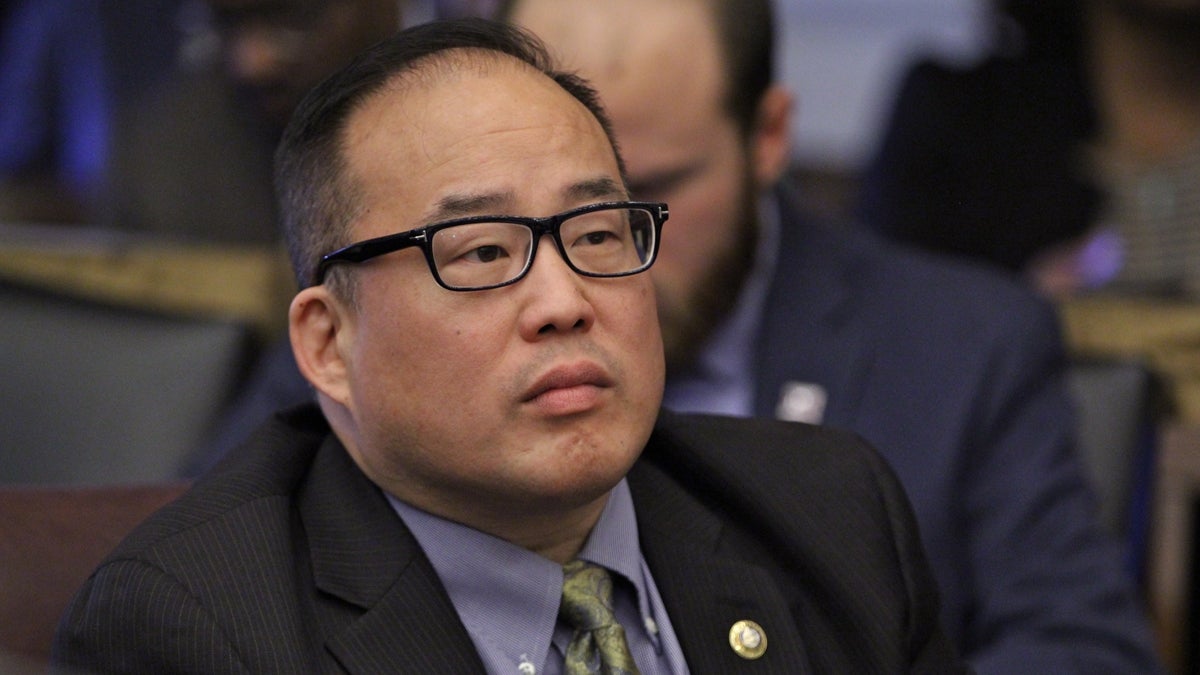Anti-squatting measure, months in the making, moves out of City Council committee
David Oh’s anti-squatting legislation has finally advanced out of committee, after nine months of relentless advocacy from the Republican at-large City Council member.
Listen 2:49
Philadelphia City Councilman David Oh. (Emma Lee/WHYY)
David Oh’s anti-squatting legislation has finally advanced out of committee, after nine months of relentless advocacy from the Republican at-large City Council member.
The legislation seeks to address what Oh’s office describes as a substantial increase in properties that are being illegally occupied while their owners are away, or as they attempt to sell off vacant homes.
“You walk up to the property one day, and there’s somebody in there,” said Mary Jo Potts of Elfant Wissahickon Realtors, who specializes in vacant properties. During her testimony Monday before the council’s Committee on Housing, Neighborhood Development and the Homeless, Potts said that in her experience there has been an uptick in squatting incidents in the last two years.
“They have a fake lease, so we can’t do anything about it,” she said. “The people who rightfully own these properties, they don’t have any rights.”
That isn’t actually the case: Property owners have recourse, but it can take months to get satisfaction. Oh’s legislation seeks to expedite the procedures of the courts and the police department, establishing a pathway for property owners to get those they claim are illegal occupants in front of a judge five days after submitting an affidavit to the Court of Common Pleas.
“The issue that this bill presents is simply this gets in front of the proper judge faster,” Oh said. “Here’s a solution, not more delays.”
Numerous property owners testified on behalf of the bill, saying that it could take months to get illegal occupants, or “criminal and defiant trespassers,” out of a property and relaying stories of wily tricksters bearings false leases. The bill is also supported by the Greater Philadelphia Association of Realtors, the Pennsylvania Apartment Association—East, and the landlord group the Homeowners Association of Philadelphia.
Over the last nine months, the councilman has made his case by highlighting several similar instances. But Oh’s office was unable to provide data that demonstrate an increase in such crimes.
Opponents argue that Oh’s legislation, which failed during its first committee hearing in November, endangers renters and only gives false hope to property owners.
Councilwoman Cherelle Parker led the effort against the bill. She sat through the entire three-and-a-half-hour hearing and repeatedly spoke passionately in opposition to Oh’s remedy, even after acknowledging that the votes were not in her favor.
“I’m really concerned that the definition of ‘criminal and defiant trespasser’ could lead to innocent victims being deemed criminal and potentially penalized,” Parker said.
Opponents of the measure include the civil legal-aid firm Community Legal Services and the Tenants’ Union Representative Network (TURN). They argued that the bill offers a stunted understanding of how rental markets work in low-income neighborhoods, where many a vulnerable renter may not have easy access to written documents that prove the right to rent a property. Many tenants agree to oral leases, pay in cash, and do not have the resources to resist regular eviction proceedings — let alone one on the five-day schedule Oh’s bill would allow. Some property owners may not even have the proper paperwork to prove their cases, given the pervasive problem of “tangled titles” in Philadelphia.
Advocate groups were especially disturbed by the idea that the only thing a owner needed to proceed with an expedited eviction was an affidavit swearing that the people living in the property were criminal trespassers. (Oh’s bill defines “criminal and defiant trespasser” very broadly.)
“The bill … tries to make the city police force a private security force for real estate developers and landlords,” Phil Lord, executive director of TURN, argued in written testimony. “Suppose a landlord threatened a tenant with an illegal lockout, which happens every day, and then shows up with two police officers asking personal questions.”
Lord said the bill would do little to help those dealing with squatters, given that much of the language is simply prompting the police and the courts to do what they are already doing. He also said that City Council didn’t have the power, under the Pennsylvania Constitution, to dictate to the courts how they should conduct their internal operations.
“I’m going to be brief, because I don’t see how this legislation helps anybody,” said Lord. “Because all it really does is say the courts have to go forward and create better procedures, which they’re working on already.”
A police department representative, Francis Healy, said at the hearing that the department is already implementing updated guidelines for addressing the problem. Along with other city department representatives, he said that the Roundhouse nonetheless supports the intent of the bill.
Oh employed law-and-order rhetoric to argue for his legislation, which proved substantially more popular Monday than the last time it came before the Committee on Housing, Neighborhood Development and the Homeless.
At the November hearing, Oh’s was the only vote for the bill. This time, Allan Domb, Cindy Bass, Jannie Blackwell, Bobby Henon, and Al Taubenberger joined him. Only Parker and Helen Gym voted against advancing the legislation.
Asked why he voted for the bill this time, Domb said that he wanted to ensure everyone was on board for the task force on squatting that Parker proposed to assure a more well-rounded response to the issue. The task force will meet for the first time on June 19.
“By voting it out of committee and having the task force, I’ve asked Councilman Oh to be open to suggestions and amendments from that committee in order to protect anyone who might be affected by this,” said Domb, the chairman of the committee. “I have a feeling from the task force we are going to get great recommendations that will clear it up, clean it up, and make it a better bill.”
Asked whether Mayor Jim Kenney would sign the bill if it were passed by the full council, the mayor’s spokesman Mike Dunn equivocated.
“The administration supports the intent of the measure and looks forward to reviewing the legislation should it gain final approval.”
WHYY is your source for fact-based, in-depth journalism and information. As a nonprofit organization, we rely on financial support from readers like you. Please give today.







